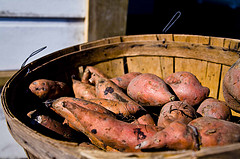 The sweet potato (Ipomoea batatas) cultivar developed in Japan and has edible leaves and stems. It is only distantly related to the potato and does not belong to the nightshade family. They are cultivated throughout tropical and warm temperate regions wherever there is sufficient water to support their growth. Sweet potato ranks as the world’s seventh most important food crop, and has major contribution to energy and phytochemical source of nutrition.
The sweet potato (Ipomoea batatas) cultivar developed in Japan and has edible leaves and stems. It is only distantly related to the potato and does not belong to the nightshade family. They are cultivated throughout tropical and warm temperate regions wherever there is sufficient water to support their growth. Sweet potato ranks as the world’s seventh most important food crop, and has major contribution to energy and phytochemical source of nutrition.
Nutrition: Sweet potatoes and leaves are rich in vitamin A (beta carotene) and C, potassium, phosphorus, sodium, magnesium and fibre, with the leaves additionally rich in vitamin K. Roots are rich in anthocyanins, particularly in the walls of the skin and leaves are rich in polyphenols.
Vitamin A deficiency: A major health problem worldwide that leads to blindness, retarded growth and death, particularly in developing countries, largely affecting pre-school children, pregnant and lactating mothers, and the rural poor. Sweet potato is a low priced crop, which can be a year-round source of vitamin A.
Space Food: Sweet potato has been selected as one of the crops for NASA’s Advanced Life Support Program. It primarily provides carbohydrate as an important energy source, beta-carotene, and ascorbic acid to a space diet.
Science:
Anti-Cancer: Due to high anti-oxidant capacity, high phenolic and anthocyanin content; colorectal cancer prevention due to anti-proliferative, anti-metastatic and apoptotic mechanisms. Polyphenols in the leaves suppress cancer cell growth, on colon, stomach, prostate, promyelocytic leukaemia showing a potential for cancer prevention.
Anti-Inflammatory: Due to anthocyanins.
Anti-Obesity: Purple sweet potato extract diminished leptin secretion, indicating that growth of fat droplets was suppressed.
Anti-Oxidant: Due to scavenging of free radicals by anthocyanins offering protection against degenerative disease. Leaves reduce oxidative stress and free radical damage due to polyphenol content.
Atherosclerosis: Protective potential of anthocyanins from purple sweet potato against low-density lipoprotein (LDL) oxidation; suppresses development of atherosclerotic lesions and oxidative stress independently of changes in cholesterol and lipid levels in mice.
Cardiovascular: Leaves reduce cardiovascular risk.
Constipation: Sweet potato had a positive impact on the prevention of constipation and the defecation satisfaction in leukaemia patients receiving their first chemotherapy.
Diabetes: Purple sweet potato flavonoids decreased blood glucose and lipids levels in diabetic rats. Useful to prevent and improve diabetic symptoms by stimulating human immune activity in addition to its anti-diabetic effects. Flavinoids in leaves controlled blood glucose and modulated blood lipid in diabetic mellitus mice. A metastudy showed insufficient evidence about the use of sweet potato for type 2 diabetes mellitus; further trials, methods and varieties of sweet potato are needed.
Hepato-protective: Intake of purple sweet potato beverage with anthocyanins significantly decreased serum levels of hepatic biomarkers in healthy men with borderline hepatitis. An extract of purple sweet potato had hepato-protective effect on liver damaged rats, it is also a good source of anti-inflammatory anthocyanins to prevent alcoholic liver damage.
Immune: Leaves improve immune function. Increased polyphenols from purple sweet potato leaves modulated the immune response in 15 basketball player during a 2 week training period.
Rheumatoid Arthritis: A chronic inflammatory condition; benefits due to anti-inflammatory and anti-oxidant properties.
Vaso-relaxation: Phenolic content and anti-oxidant properties of leaves afford protection at the vascular endothelium level.
UV Protection: Anthocyanins extracted from purple sweet potato and added to cosmetic cream improved the cream’s UV absorption ability, particularly against UV-B rays.
Adding Sweet Potato to your Diet:
- Cooking by steaming preserves the anti-oxidant and polyphenol contents
- Delicious roasted in thick slices
- Wedges or chips as a treat
- Mash (can add yogurt or coconut milk for a creamy version or cayenne/ ginger / curry for a spicy version)
- As soup with variations of ginger, sesame oil, curry powder, sour cream, lime juice, coconut milk
We are happy to advise you on your health matters.
 Lin Bridgeford DO KFRP FSCC ICAK (UK) MSc
Lin Bridgeford DO KFRP FSCC ICAK (UK) MSc
Registered Osteopath & Kinesiologist & Yoga Teacher
Aether Bios Clinic
Saltdean
01273 309557
07710 227038
